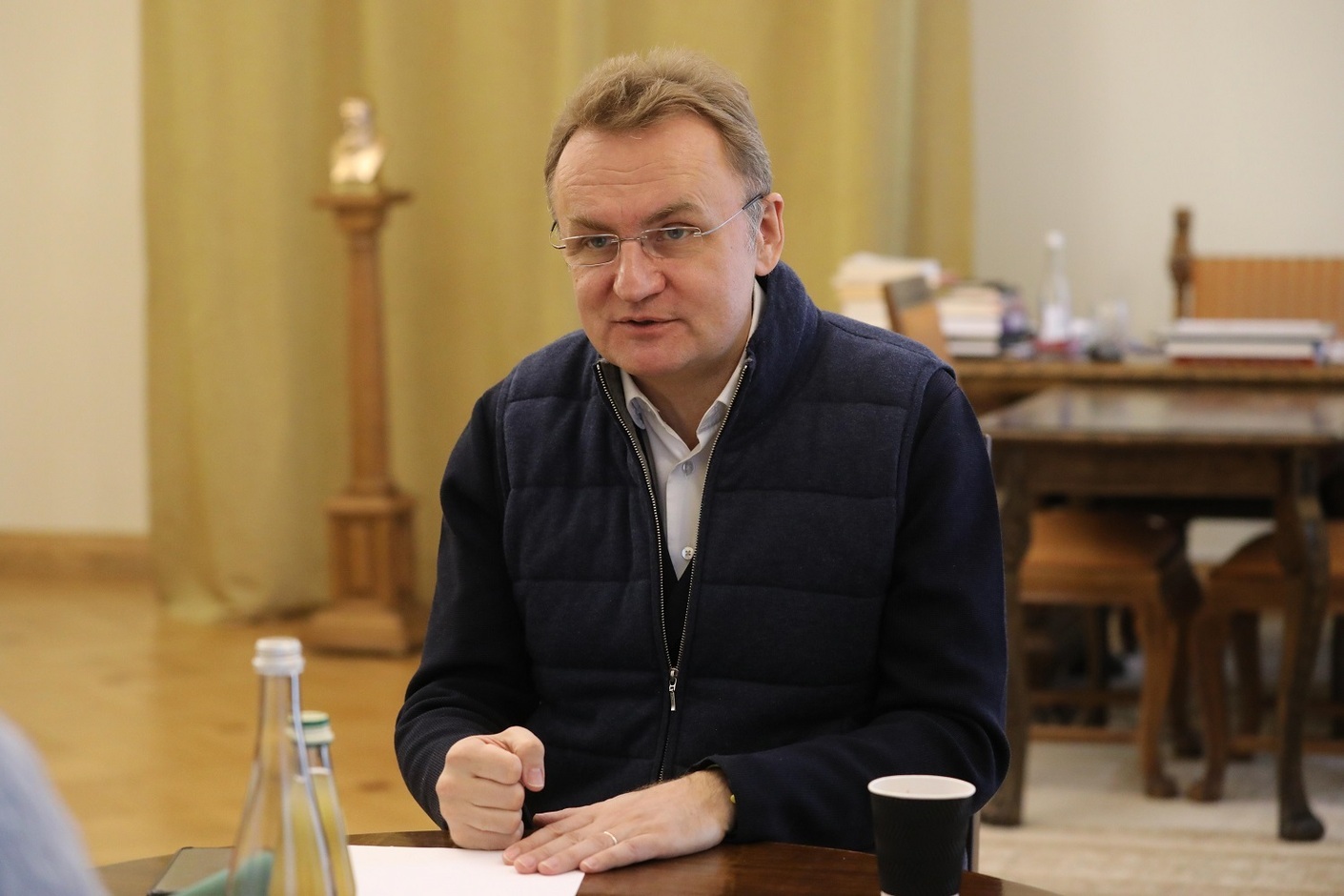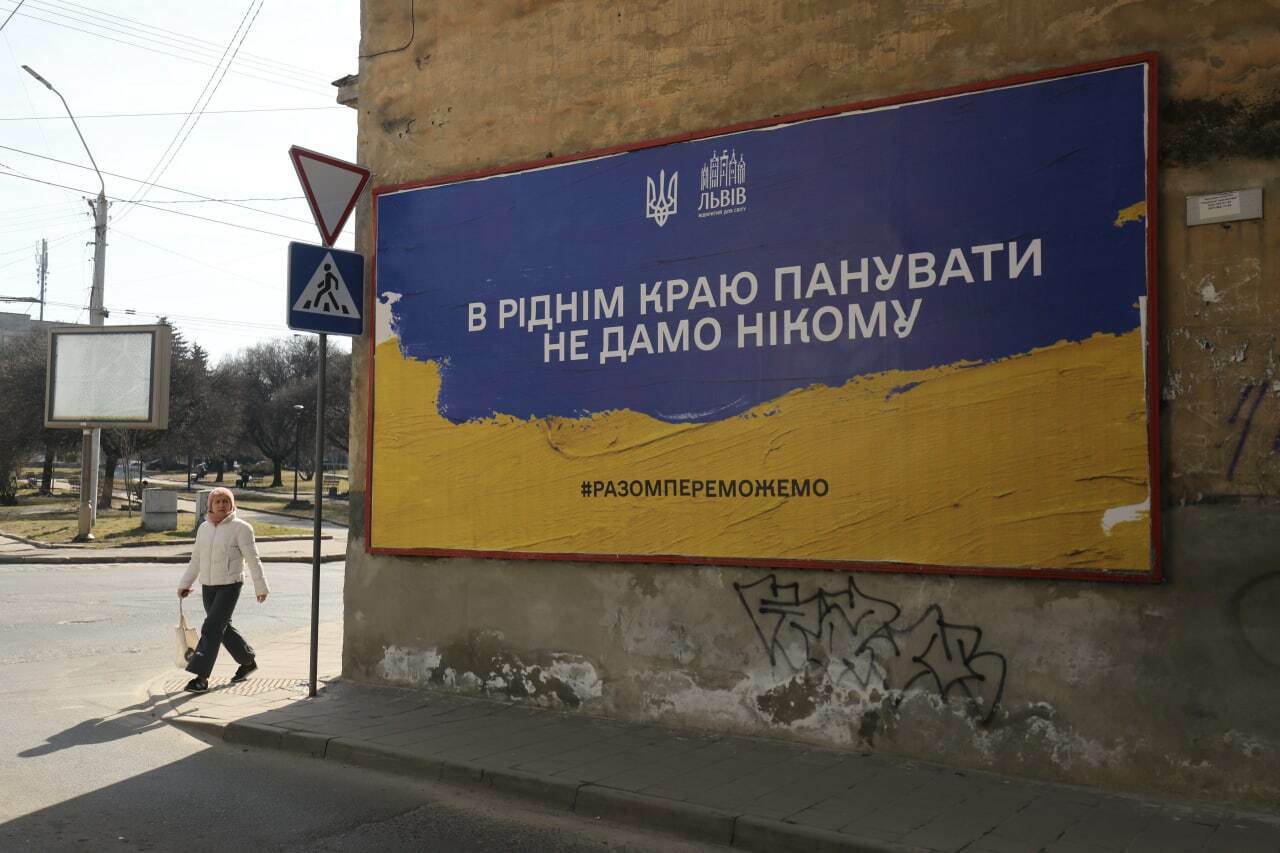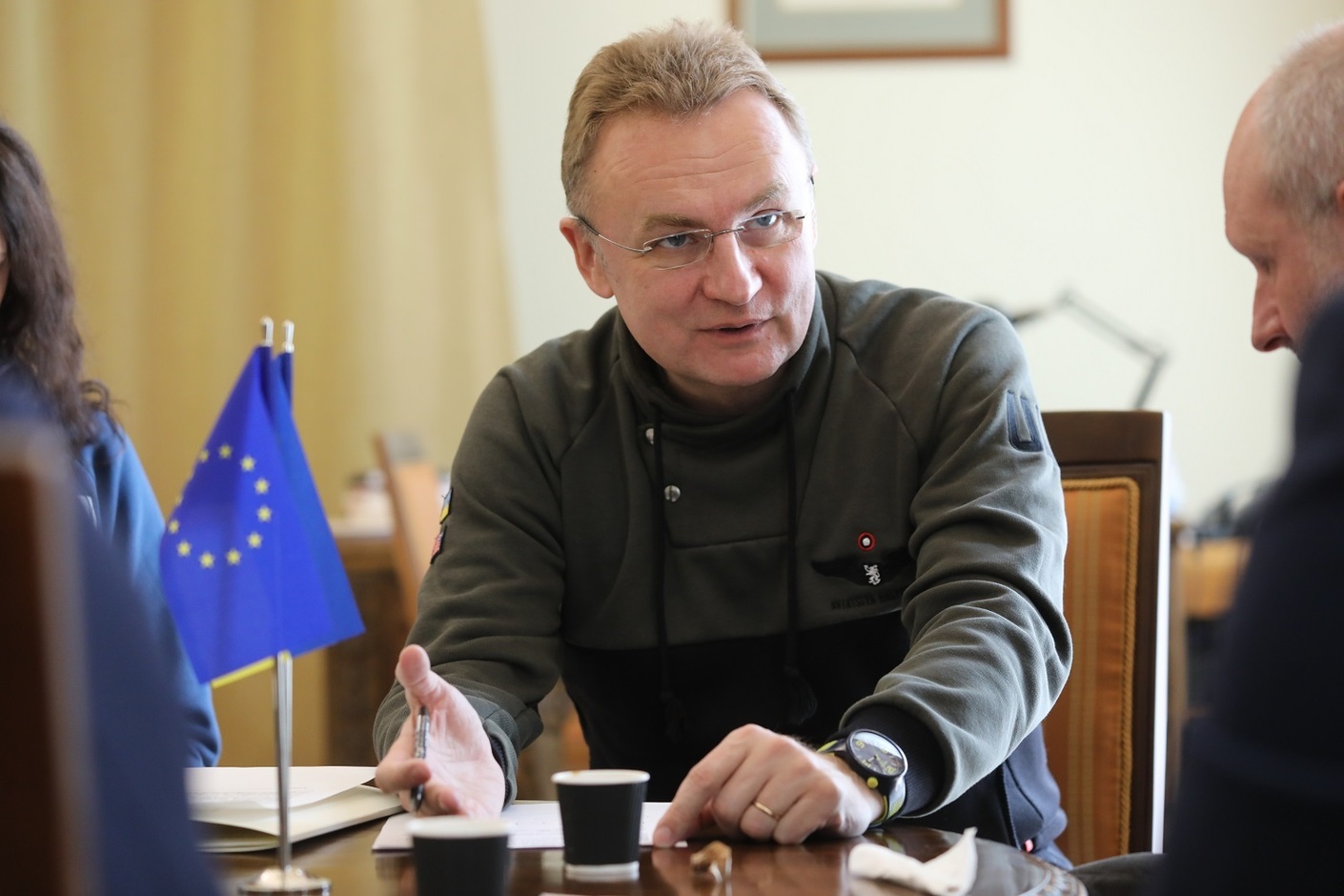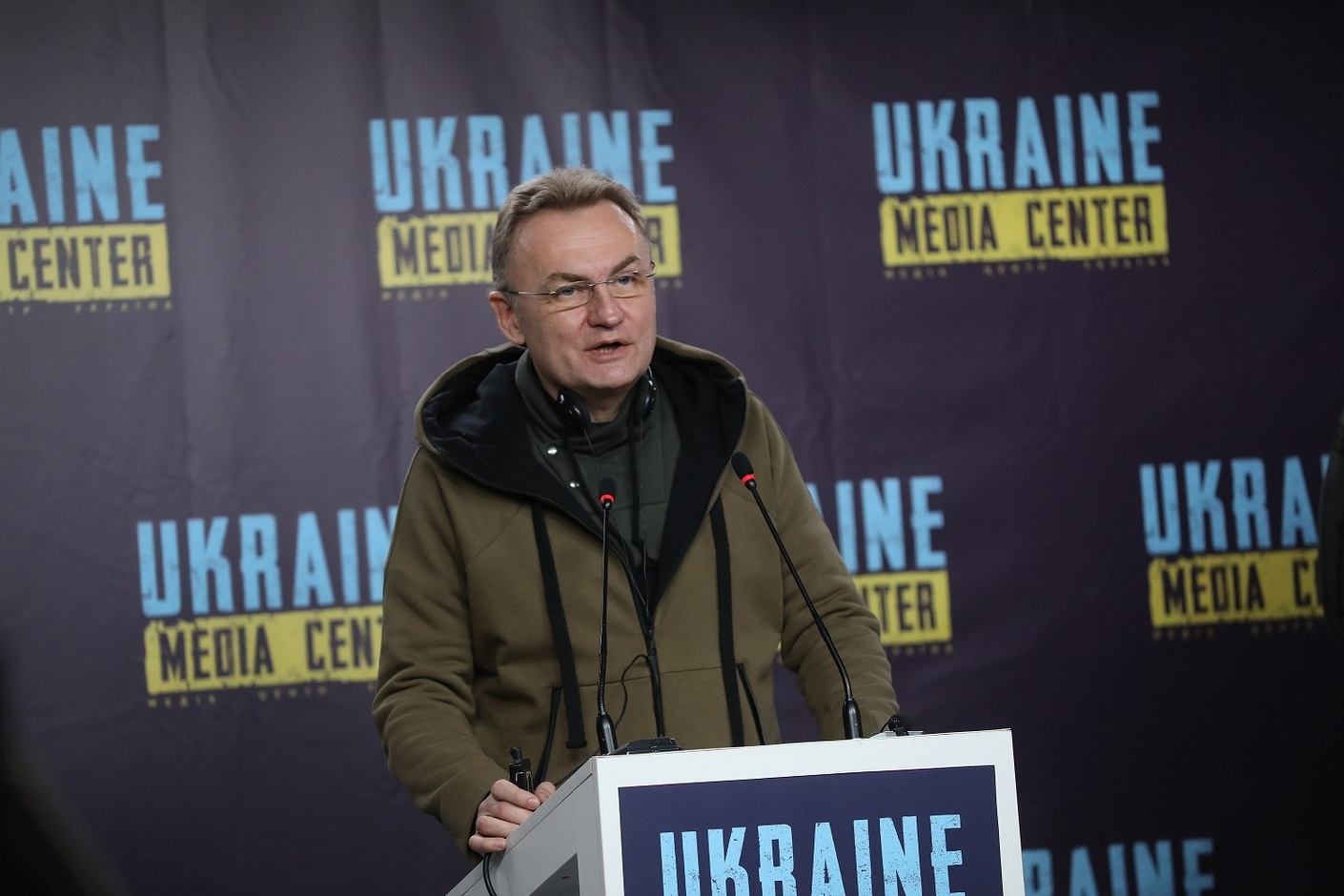“War makes us more honest and takes away a lot of superficialities.” Interview with Andriy Sadovyi

Andriy Sadovyi told Decentralization about the ways representatives of local self-governments can bring our victory closer, about survival in Lviv, David’s Sling for Ukraine and many other things useful for the heads of municipalities
Text by: Dmytro Syniak
The spacious office of Lviv Mayor Andriy Sadovyi in the old town hall on Rynok Square exudes certain unique grandeur. High walls, exquisite furniture and reproductions of paintings of the old Lviv serve as an involuntary reminder of the city’s past. And it was often stormy. For example, in September 1939, from the same office, Lviv President Stanisław Ostrowski organised the defence of the city streets from Nazi invaders, who were later joined by the Soviets. And in 1915, Lviv President Josef Neumann governed the city, which was again defending itself from Russian troops. Throughout its long history, the capital of Halychyna (Galicia) has repeatedly found itself in the middle of various wars and has always been able to survive and live on. Perhaps that is why the people of Lviv adapted so quickly to the next Russian aggression. Andriy Sadovyi started preparing the city for it long before the invading army gathered on our borders. Now he has many cases that can be useful to the heads of municipalities throughout Ukraine. He shared some of them with Decentralization.
Providing the city of a million people with water without electricity
How can the work of local self-government authorities during the war bring our victory closer? What areas should be worked on?
Six months ago, I instructed my subordinates to ensure the water supply to Lviv without electricity. At first, people looked at me as if I was crazy. “If there is no electricity, there will be alternative sources of energy!” they said. “There will be no alternative sources!” I objected. It seemed like a bunch of malarkey at the time, but now everyone can see that I was right. And a month before the start of the war, as Chairman of the Chamber of Local Authorities of the Congress of Local and Regional Authorities, I also began discussing the issue of the potential reception of refugees with the mayors of various cities. That, too, was seen as a bit odd, to say the least, although the Russian army had already begun gathering near Ukraine’s borders. Nevertheless, Ivano-Frankivsk, Ternopil, Kalush, Uzhhorod, Rivne and other cities worked on this issue and gave me some figures. We have also ensured the food and health security of our cities by purchasing a lot of medicines and products.
How did you manage to predict something that seemed impossible, unbelievable?
There is no mystery here. Not long ago, I started working with English experts under the Resilience Programme. This word literally means the capacity to recover, i.e. readiness for various emergencies. Later, we founded a school in Lviv under the preliminary name Resilience Residence, which was to train local self-government employees from all over Ukraine. The main point of this training was to anticipate problems in advance and find creative ways to solve them. This allowed Lviv to build a good scheme of interaction between the City Council and the institutions of the Ministry of Defence, the Ministry of Internal Affairs and the Ministry of Health. We even set up a working group trained in the British city of York, home to the Emergency Planning College*, one of four public institutions where local self-governments can learn to respond to emergencies in their municipalities. The greatest effect of this training was getting rid of a certain mental block: we stopped believing that the situations we are working on are ‘in principle impossible’. This helped us a lot to prepare Lviv for the war, even at a time when it still seemed impossible. Due to this, our municipality quickly reoriented itself in the first days of the war and accepted about 200,000 internally displaced persons without any big problems. And this did not lead to a collapse in the supply of any services: we had electricity, water and heating, public transport was running...
What are the tasks of the Lviv City Council during the time of war?
Our first and most important task is to help the Armed Forces of Ukraine. We are also actively building our Territorial Defence Forces, providing them with everything they need. To do this, we first had an active recruitment centre, which recruited people to the Territorial Defence units. Later we sewed uniforms for them and provided them with all the necessary ammunition. After all, the state only provides two of our brigades with weapons and pays their commanders. Everything else falls on the shoulders of the Lviv municipality, volunteers and people making donations. Our next task is to ensure that the utility services are running smoothly given that the load on the city infrastructure has increased by at least 20%. This goes without saying, and there can be no question of any, say, interruptions with garbage collection, water and electricity supply. However, this area actually requires a lot of our attention. The third task is to provide IDPs with everything they need such as clothes, hot meals, a roof over their heads. I tell all my subordinates that we should love the IDPs like our own parents because what they are looking for here is shelter from bombs and missiles. It is our duty as citizens, Christians and ordinary people to give them a warm welcome. The fourth task is to properly communicate with the world and with international institutions that are ready to help Ukraine. Every head of the municipality must now be able to address these challenges.
You spoke out against rising rents in wartime and even called those who hike up prices ‘looters’. Did you manage to curb the increase in the cost of rent?
In a way, yes. In fact, my public statements alone were enough for that. Although I must admit that some looters did not listen to me. But we know their names very well and will seize the real estate from them as soon as the Verkhovna Rada votes in favour of the bill. They’re currently working on it. At least, this was reported by Hetmantsev**.
Lviv has suffered 6 missile strikes, and there might be more. Are you still working on equipping bomb shelters?
We have about 6000 bomb shelters in Lviv. We did the basics in order to fix them up. Now it’s up to the residents to get involved in tidying up these facilities without waiting for others to do it. After all, their lives may depend on the state of shelters and the level of comfort there tomorrow. On the other hand, we are now making changes to the Rules of Housing Construction in Lviv, which will place special emphasis on the construction of bomb shelters, equipping them with everything they need, etc. We are entering a new era in which we must be ready for new missile strikes every day. At the same time, we must act in such a way as to prevent these strikes from harming us.
About international relations and relocated companies
What role did the international relations of the Lviv City Council play in the struggle of the Ukrainian people against Putin’s aggression?
First of all, it is thanks to them that Lviv has received a huge amount of humanitarian aid, most of which we immediately transferred to the east, to those municipalities that are faring much worse than us. The mayor of Cannes, France, brought us bulletproof vests; the mayors of Polish cities such as Krakow, Gdynia, Katowice, Przemyśl, etc. handed us 27 buses with humanitarian aid. We had to keep the buses ourselves, as we transferred ours to the eastern regions of Ukraine. Together with international organisations, we are now planning to build housing for IDPs. It is estimated that after the end of active hostilities, about 50,000 people will stay. They require about 1 million square meters of housing.
How long does it take to build it?
Provided that systematic efforts are ensured, one and a half to two years. We are talking about both temporary housing and capital development, as well as temporary capital development. As early as this week, we are starting the construction of a temporary container town for 1,000 persons. The construction of two-storey wooden houses for a longer period is also starting. We are currently planning to house expectant mothers in these houses.*** Last but not least, in order to start the capital development, we are now conducting an inventory of all building permits issued by the city. In the future, we want to launch a large mortgage programme so that people who will work in Lviv will be able to buy out these properties.
Will there be work for 50,000 IDPs in Lviv?
Many companies have relocated here from the east, together with their employees. Many offices have been built in Lviv over the last two years, so there will be no problems with this. We also have a lot of production facilities, which will get new life thanks to the relocated companies. In addition, we are currently creating three industrial parks in Lviv, and their capacities can also be used.
Can we say that as a result of such forced displacement of companies, the economic centre of Ukraine is shifting from east to west?
We are not thinking about it. Our task now is to survive and then to show certain dynamics of development. Yes, the word ‘survival’**** very accurately conveys the essence of this challenge. It also fully reflects the modern way of life of the state of Israel. It lives under the constant threat of missile strikes that are repelled by a network of missile defence systems, commonly known as David’s Sling. Protected by it, people live, work and fall in love normally. Enemy missiles do not even prevent Israel from being an investment-attractive country. We must have an even better air defence system while adopting the experience of countries with the most advanced forms of national defence. First and foremost, I mean Switzerland and Finland.
The voice of society
Can local self-government officials in Ukraine help in the implementation of the defence experience of partner countries, using their links with local communities?
We have already started working on this. I hope that martial law will be lifted by the end of the summer, and then we will do it much more actively. Then there will be business trips to such countries and agreements on cooperation with them. We have already started on some things. Earlier I told you about the Resilience Residence. In addition, we have established a Medical Residence, an Economic Residence, an Ecological Residence and so on in Lviv. In each of these directions, we operated as follows. Initially, we selected about twenty people from neighbouring municipalities on a competitive basis. They came to us for lectures and practical classes that took 4-5 days. On the first day, we always held philosophy classes: we analysed the works of Plato, Havel, Skovoroda as well as, if we were dealing with healthcare professionals, Hippocrates. This was to make every local self-government official realise that everything they were studying now had actually been invented long ago. And also so that each of our students received, so to speak, a basic level of stoicism. I believe that this philosophy is the one best suited for local self-government officials… In the following days, we would work with specific directions. For example, at the Architectural Residence, the best Ukrainian architects spoke about the cases they implemented in Lviv, as well as explained the effect of certain decisions of local authorities on urban planning and architecture. As part of the Medical Residence, we talked about how Lviv has become a national transplant centre in one and a half years. We had a total of twelve such directions.
The war must have forced you to suspend this work, right?
Indeed, but instead, we were able to apply our expertise to other areas of import. For example, we held an online residency on Territorial Defence Forces. We gathered representatives of the municipalities of Lviv region and asked the command of the Territorial Defence of Ukraine to answer our questions. We will later include this direction into the Resilience Residence, as it is directly related to survival. As part of this course, every resident of the municipality must learn to use weapons, be able to provide medical care, and know how to act in certain situations that may arise during the war. Who but the municipality will teach them this?
Does Lviv, through its international ties, influence the governments of different countries to strengthen sanctions against Russia? And if so, how?
The growing number of victims in Ukraine urges Western governments to increase their aid to Ukraine and strengthen Russia’s international isolation. For many politicians in these countries, the Bucha massacre became a revelation. Before that, they believed that things like that could only happen in books and films about World War II. But mayors are always one step ahead, so they understand the situation best. Now the vast majority of them are fiercely lobbying for Ukraine’s interests. And public statements are often enough for this. After all, every Western state-level politician is sensitive to the opinions of mayors, opinion leaders and journalists. They are the voice of society.
Viktor Mykyta, Head of the Zakarpattia Regional Military Administration, announced that the region was ready to receive IT professionals and even provide them with exemptions from conscription. Are you planning to do something similar?
Before making this announcement, Viktor Mykyta consulted with Maksym Kozytskyi, Head of the Lviv Regional Military Administration. Because Lviv has already created an IT cluster with about 30,000 professionals. And now we are involving them as much as possible in cooperation and assistance to the Armed Forces of Ukraine. Many IT professionals from Lviv have taken up arms and are defending Ukraine. Others support the military by performing special IT tasks. That is, the exemptions from conscription are a conditional thing. We should not stop those who rush to take up arms to destroy the enemy. However, there are also experts who can write software that will do great damage to the enemy. They should not be forced to sit in the trenches.
The Millennium War
Halyna Mynayeva, Mayor of Chuhuiv, said in her interview with Decentralization that the Lviv City Council had been helping her municipality since the first days of the war after contacting them yourselves. What other cities did Lviv provide assistance to? How were these cities chosen?
There are hundreds of such cities and towns. Because every day dozens of cars come to Lviv with humanitarian aid, which we sort and deliver to where it is needed. In fact, in the first days of the war, it was a considerable challenge for us. At that time, 85% of truckloads were second-hand clothes, and medical care consisted of medical gowns and covid face masks. Obviously, we were grateful even for that, but we needed completely different things. Now we just don’t know what to do with the tons of unnecessary things that have accumulated in Lviv. We gave what we could to the army, to orphanages, to volunteer centres. But there is still a lot left. We immediately send the things that could be needed eastward: to Chuhuiv, to Kharkiv, to Kyiv, to Mykolaiv. I believe there is not a city on the map of Ukraine that we would not help.
Mayor of Chuhuiv: The shelling of the city has not stopped for a day since the beginning of the war https://decentralization.ua/news/14748
Handling the distribution of humanitarian aid requires a lot of effort. Meanwhile, the Lviv City Council clearly lacked a unit that would have appropriate functions. How did you solve this problem?
Resolving the issues related to humanitarian aid was entrusted to the Department of Development, which includes the Culture, IT and Youth Policy Divisions. This department was the one to open large volunteer centres in our municipality, and it is currently overseeing the provision of food to IDPs.
So the municipal authorities should become a coordinator of defence efforts in their municipality, is that right?
No, because in wartime, the seniority in the region is given to the Head of the Military Administration, and everyone must be in strict subordination to him. That is, there must be unity of command. Therefore I always discuss all important issues with Maksym Kozytskyi. This does not harm any process at all, because there is so much work that everyone has enough on their plates.
On the other hand, you must have had to abandon the development of many areas, because it’s not the time for them now, right?
Yes, indeed. For example, we suspended all capital development works and major repairs. We also furloughed about 600 of our employees, and many others were reoriented to more urgent tasks. We now have everyone and everything focused on survival, assistance to IDPs and defence needs.
Have local taxes changed during the war?
We reduced all taxes as much as we could. Individual entrepreneurs were exempted from paying rent for the municipal property, tourist tax and advertising tax. We have also taken a differentiated approach to land tax collection. The competent committee of the City Council, responding to the requests of individual entrepreneurs, determines whether they can pay this tax or not. And if it turns out that they cannot, we waive it.
Since 2014, Lviv has always hosted the International Forum of Local Self-Government in June. Is the forum planned for this year, since it would be very appropriate right now when local authorities in Ukraine face so many new challenges?
It all depends on the situation at the front lines. At the same time, we keep in touch with all the cities that participated in the forum. In a sense, we can say that this forum is now working online every day. And we will be able to hold its final part when we have a break in the war with Russia. As for when this war is over, I would not be optimistic. It may last a thousand years.
Is Lviv ready to help the cities looted by Russians with backup office equipment? For example, Yuriy Bova, Mayor of Trostianets, said that the Russian orcs had not left behind a single computer in the Trostianets City Council.
If there is such a request, of course, we will help.
Inspirational billboards instead of obscenities
You advocated for the ban on selling alcohol in the Lviv municipality. Why was it lifted after all?
It was not lifted. We have only allowed the sale of alcohol made by natural fermentation starting from April 2. It is basically dry wine and beer. A month ago, the ban on selling alcohol was the right move. At that time, there was a high risk that people would relieve their stress with alcohol, and this usually leads to severe depression. In addition, we wanted to keep a sober mind in an emergency that most of our people have encountered for the first time in their lives. But now the victories of our army near Kyiv as well as Sivershchyna and Slobozhanshchyna regions have somewhat relieved the constant stress caused by the war in the minds of the people. In addition, the month is the longest possible period for banning the sale of alcohol. After that, smuggling routes and underground smuggling shops are set up. We would like to avoid that, so we partially lifted our ban. It was time.
Lviv is a gem of European architecture. What has the City Council done to protect it from the effects of possible air strikes?
We covered the monuments and windows of historic buildings with sandbags and special fences as well as hid the majority of the historical valuables in the basements. I think we did everything necessary.
Is it true that you oppose the placement of numerous billboards with obscenities addressed to Russian soldiers and, in particular, to the Russian warship in Lviv?
In the first week of the war, the placement of billboards with obscenities was justified. This gave people an outlet for some emotional relief. However, now we have to replace swear words with something inspirational. Instead of cursing the Russian warship, we must believe in and strive for victory and help the Armed Forces. That’s what should be on billboards, and the Lviv City Council is developing some designs and offering them to entrepreneurs. War reveals true faces. War makes us more honest and takes away a lot of superficialities. I would very much like each of us to find an opportunity to smile, to speak kindly and to support others in this difficult time. And all negative emotions should be directed at the enemy, beating it as hard as possible. We do not choose when and where we are born. So we were destined to go through this war. But we can choose to be human, even in the most difficult conditions, or not to be.

* Literally: the College of Hazard Planning.
** Danylo Hetmantsev is a Ukrainian lawyer, politician and researcher, MP of Ukraine, Chairman of the Verkhovna Rada Committee on Finance, Tax and Customs Policy.
*** Local term for pregnant women.
Survival means continuing to live even after almost dying as a result of an accident, illness, etc.
Tags:
war stories report war stories special project
Область:
Львівська областьГромади:
Львівська територіальна громадаSource:
Пресцентр ініціативи "Децентралізація"
22 November 2024
Уряд затвердив розподіл додаткової дотації для місцевих бюджетів на майже 800 млн грн
Уряд затвердив розподіл додаткової дотації для...
22 листопада, Уряд затвердив черговий розподіл додаткової дотації для місцевих бюджетів, повідомили у Міністертсві...
22 November 2024
Окремі питання обмеження доступу до публічної інформації в ОМС в умовах воєнного стану
Окремі питання обмеження доступу до публічної...
Програма USAID DOBRE підготувала відеороз’яснення на тему: «Окремі питання обмеження доступу до публічної інформації...
22 November 2024
Конкурс «Громада на всі 100»: став відомий список фіналістів
Конкурс «Громада на всі 100»: став відомий...
Завершився другий етап конкурсу «Громада на всі 100», під час якого серед 261 громади обрали 40 учасників, що...
22 November 2024
Division of competences between the state and...
18 листопада у Бучі відбувся круглий стіл щодо розподілу повноважень органів місцевого самоврядування та органів...

